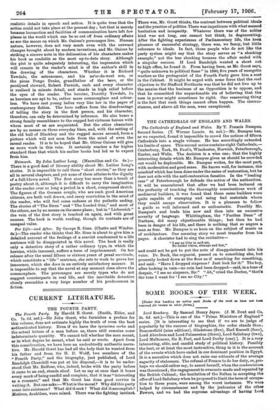CURRENT LITE RAT ETRE.
THE FOURTH PARTY.
The Fourth Party. By Harold E. Gorst. (Smith, Elder, and Co. '7s. (Id. net.)—Sir John Gorst, who furnishes a preface for this volume, does not estimate highly the truth of even the best authenticated history. Even if we have the ipsissima verba and the actual letters of a man before us, there still remains some indeterminate quantity. We cannot tell whether the man meant, or in what degree he meant, what he said or wrote. Apart from this consideration, we have here an undoubtedly authentic narra- tive. Mr. Harold Gorst has had all the help that he wanted from his father and from Sir H. D. Wolff, two members of the "Fourth Party," and the biography, just published, of Lord Randolph Churchill was put at his disposal,—it is to be under- stood that Mr. Balfour, who, indeed, broke with the party before it came to an end, stands aloof. Let us say at once that it bears every mark of being candid and complete, that it is as "interesting as a romance," and that Mr. Gorst has done good service in Writing it. But one asks :—What is the moral? Why did this party come into existence ? What did it seek ? What did it accomplish ? Motives, doubtless, were mixed. There was the fighting instinct. There was, Mr. Gorst thinks, the contrast between political ideals and the practice of politics. There was impatience with what seemed hesitation and incapacity. Whatever there was of the nobler kind was not long, one cannot but think, in degenerating. After the fighting experiences of Parliamentary life, the keen pleasure of successful strategy, there was, we fancy, but little reference to ideals. In fact, those people who do not like the party system might say that the story serves as "a shocking example," not the less shocking because the affair ended with a singular success. If Lord Randolph wanted a short cut to high office, he found it. From having been, as Mr. Gorst says, "quite unknown to political fame" in 1880, five years of energetic warfare as the protagonist of the Fourth Party gave him a seat in the Cabinet. It might be urged with some force that the real objection to Sir Stafford Northcote was that he did not live up to the maxim that the business of an Opposition is to oppose, and that he committed the unpardonable sin of believing that the men in power might sometimes be right. One reassuring thing is the fact that such things cannot often happen. The circum- stances, and above all the men, were exceptional.










































 Previous page
Previous page